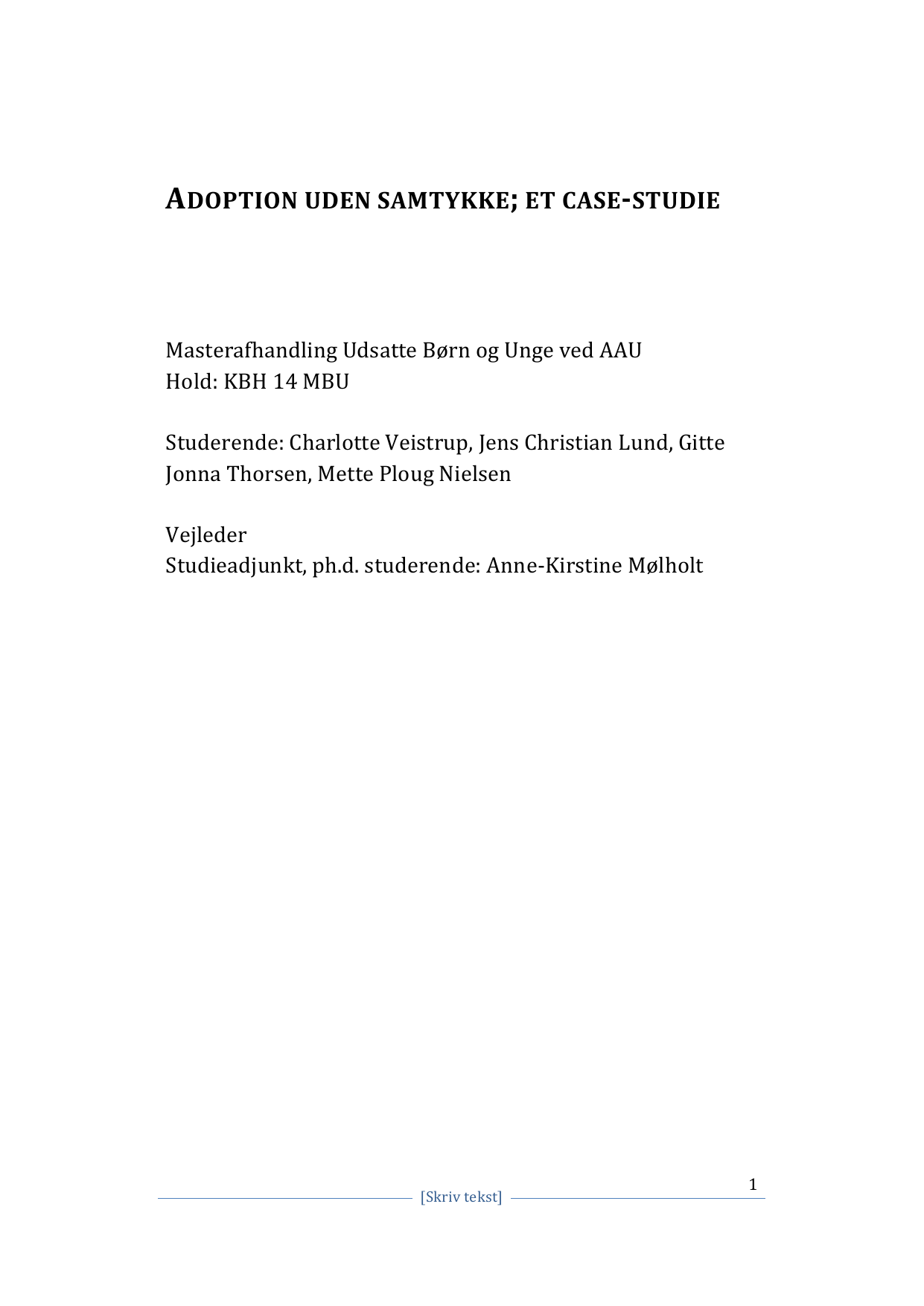
Adoption uden Samtykke: Et Casestudie
Oversat titel
Adoption without Consent : A Casestudie
Forfattere
Semester
4. semester
Udgivelsesår
2016
Afleveret
2016-01-11
Antal sider
85
Abstract
Resumé Denne afhandling er forfattet af fire master studerende, som den afsluttende afhandling i forbindelse med 4. semester på Master for udsatte børn og unge ved Ålborg Universitet, afdeling København og skal forsvares ved en gruppeeksamen med ekstern censor ultimo januar 2016. Afhandlingen skildrer studiegruppens metode, teorivalg, analyser, konklusioner og perspektiveringer. Formålet med afhandlingen er at sætte fokus lovgivningens intentioner og myndighedssagsbehandlernes brug af adoption uden samtykke. Studiegruppen ønsker at indgå i og nuancere debatten om – hvad der gør at brugen af adoption uden samtykke ikke bliver benyttet i den grad som et politisk flertal ønsker det. Intensionen med den afhandling er at den skal ud og leve blandt socialrådgiverne i Stevns og Lollands Kommune. Indholdet skal dermed have fokus i det praksisnære og formidlende så socialrådgiverne kan kvalificere deres refleksioner ud over forforståelser, foretrukken viden og holdninger. Det empiriske materiale er fremkommet ved to fokusgruppeinterviews. Ét i Stevns Kommune og ét i Lolland Kommune. Denne afhandlingen er baseret på at verden ikke udelukkende kan beskrives objektivt, og tager dermed et socialkonstruktivistisk udgangspunkt. Analysen er foretaget med følgende teorier som gennemgående afsæt: Uri Bronfenbrenners økologiske udviklingsmodel, Michael Lipskys teorien om Street-Level Bureaucracy og Lars Inge Terum fire skønsformer. Analysen fremkommer med følgende resultater: socialrådgiverne medtænker ikke adoption uden samtykke i deres praksis. Og de oplever generelt ikke at der er behov for lovgivningen. Socialrådgiverne er alle enige i at de alene ser lovgivningen relevant i forhold til fremmedadoption, hvis det drejer sig om et nyfødt barn, uden søskende og med forældre som entydigt er uden forældreevne. Ligeledes er de enige om at plejebørn alene bør adopteres, hvis plejeforældrene er villige til at adoptere barnet. Endnu et fund er at socialrådgiverne kun i lille grad inddrager og involvere barnet, når de overvejer adoption. Socialrådgiverne i interviewene udviser ikke modstand på lovgivningen, men giver henholdsvis udtryk for at de ikke oplever behovet for loven eller at lovgivningen ikke er blevet en del af deres ”værktøjskasse” endnu. Socialrådgiverne er meget bevidste om barnets her-og-nu situation men de forholder sig kun lidt til barnets samlede liv. Dette viser sig ved at de generelt er meget bevidste om ikke at give barnet endnu et skift, ved at indstille det til fremmedadoption
Summary This dissertation has been written by a team of four postgraduate students concluding the fourth and final semester of a program at the Copenhagen branch of the University of Aalborg leading to a Master’s Degree in Vulnerable Children and Youth Studies. In late January 2016, the dissertation will be defended at a group examination in the presence of an external examiner. The dissertation elaborates the study group’s methodology, choice of theories, analyses, conclusions and perspectives. The object of the dissertation is to focus on the intentions behind the legal basis for adoption without consent and the use of adoption without consent by government caseworkers. It is the study group’s desire to contribute to and nuance the debate on why adoption without consent is not being used to the extent intended by the political majority. The dissertation intends to figuratively embed the reader with the social workers in the municipalities of Stevns and Lolland. Consequently the content will communicatively focus on the practices and perceptions of the involved social workers allowing them to qualify their deliberations, thus supplanting preconceptions, received knowledge and opinions. The empirical materials are derived from two focus group interviews: one conducted in Stevns Municipality and the other in Lolland Municipality. This dissertation is based on the premise that a description of real world conditions cannot be entirely objective, and, therefore, the dissertation has a social constructive perspective. On the whole, the analysis has been based on the following theoretical models: Uri Bronfenbrenner’s ecological development model, Michael Lipsky’s “Street-Level Bureaucracy” theory, and Lars Inge Terum’s four forms of bureaucratic interpretation. The analysis leads to the following results: Social workers do not consider the option of adoption without consent when conducting their practical work, and they generally do not see a need for the legislation on this matter. The social workers all agree that they consider the laws on adoption without consent to be solely relevant in relation to non-familial adoptions in the case of newborn children without siblings whose parents are clearly devoid of parenting abilities. Likewise they agree on the adoption of foster children by consenting foster parents. Another finding is that the social workers only to a limited extent consider the wishes of the child when adoption is being considered. During the interviews, the social workers did not express opposition to the laws on adoption without consent. However, they stated either that they did not perceive a need for legislation on adoption without consent or that the laws had not yet become part of their “toolbox”. The social workers are very conscious of the child’s situation in the present, but they only give limited consideration to the child’s life in its entirety. This is demonstrated by the fact that they are very conscious about not subjecting the child to yet another life-changing event by recommending non-familial adoption.
Emneord
